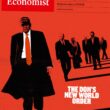Ghislaine Maxwell was arrested in New York last week, exactly 30 years after (we now know) her late father robbed the Daily Mirror pension fund of a cool £500m. A few days later, the renamed Reach Plc updated investors on its financial and strategic difficulties which have continued – almost uninterrupted – since Robert Maxwell fought desperately to save his crumbling media empire.
The business which, predictably enough, slid further backwards in the lockdown second quarter (revenue down 27%), has yet to demonstrate a convincing longterm strategy.
Announcing a reduction of 550 people (12%) to save some £35m from next year, CEO Jim Mullen reported that online registrations were now 2.5m and would be 10m within two years. It also reported 41m unique monthly visitors.
The reaction of investors was swift and sliced 15% off the share price. Analysts remain calm about a company that has, if nothing else, successfully shredded its debt. But the strategic weakenesses remain for a business characterised by:
- A seemingly impressive 41m unique visitors but they’re spread right across a mish-mash of 100 newspaper web sites. So, although it claims to have a larger UK audience than the Daily Mail, Reach’s mixed bag of sites and audiences cannot be compared with the singular focus of Mail Online or The Sun.
- A committment to chasing up online registrations but, sometimes, the only data it collects is an email address.
- All new services (including its hyper-local news) are advertising-funded. But the group’s profit is dependant on the 50% of revenue that comes from fast-declining copy sales, especially for the Mirror and Express national dailies.
- Digital advertising revenues (only some 15% of the total) have been falling not rising. The fact that total digital revenue fell by 15% during the second quarter (albeit less than the decline in print) is not what you would expect from a company chasing a new digital future.
- Reach reports that it is “debt free” but that excludes some £400m of pensions deficit (a Maxwell legacy) which continues to starve the company of the resources it needs to transform a business still dominated by print.
Mullen is doubling his efforts to create digital-only “Live” services, especially in areas where the company does not have regional newspapers. But this most digital of news group CEOs will have to persuade investors to let him do much more than merely meet his company’s historic debts and pay dividends.
Reach needs, at the very least, to acquire one or more significant digital businesses to change its profile and profits. The acquisitions could be in e-commerce, news, entertainment, or sport. The publisher might also start creating online audio or video channels – with new brands as well as existing ones. Could the Daily Mirror launch a popular version of the UK radio/ podcast/ streaming network launched this month as Times Radio?
It should consider spinning-out digital and specialist “verticals” from its national newspapers, perhaps including sport, politics, puzzles, property, and food. It might even strike online partnerships with radio and TV broadcasters: everyone’s trying to build online brands.
There may be plenty of scope to reinvent this traditional media business. But we should be troubled by Jim Mullen’s plans for “a more centralised structure bringing together national and regional teams across print and digital to significantly increase efficiency and remove duplication while maintaining the strong editorial identity of our news brands”.
It sounds good and will save costs, of course. It might also yield windfall gains from the disposal of some of its £120m of freehold property all over the UK. But the rationalisation also risks derailing any longer-term strategy by tying digital developments too closely to the traditional print business. Like newspaper groups everywhere, Reach’s medium-term tasks are to:
- Maximise the profits from the print newspapers
- Develop new digital brands
- Use the promotional power, relationships and audiences of the legacy print as a runway to launch new core businesses
The point about such “runway” strategies is that these publishers do still have powerful platforms which can be used to create new products and services. Their voice is loud. But they must ensure that the much-needed new business cannot be suffocated by the print legacy. Managing the inexorable decline of the labour-intensive newspaper business alongside fledgling digital growth seems an unlikely recipe for success.
More than that, the £220m Reach Plc needs to be able to demonstrate to investors the success of digital-only media in order to justify acquisitions. It must be encouraged to invest at least some of its “excess” cash, which again last year was mostly swallowed up by the combination of debt and pension repayment, dividends, and the continuing cost of phone hacking litigation (another legacy). History continues to hold back the UK’s largest news company.
Apart from all else, trying to soothe investors with talk of a return to paying a dividend as soon as possible (as Reach did this week), confirms that the short-term cash strategies are (still) winning over anything more exciting and longterm. It’s been that way ever since Robert Maxwell stole the pensions.




